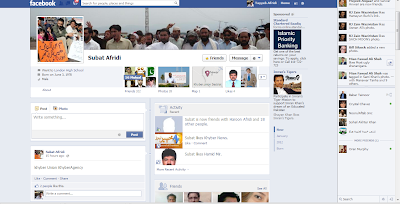Published in the KUT News----Austin, Texas University.
I read on Facebook recently that the Taliban had attacked the Pakistan Naval Base in the southern part of Karachi. Karachi is Pakistan’s biggest shipping port. As I read the story published by the Express Tribune Newspaper, I saw a Tweet about what was going on in Karachi during the attack. To see a Tweet in the midst of a reported piece was astonishing to me. We have still traditional journalism in the Federally Administered Tribal Areas, or FATA. It’s very new there, and people don’t really know or understand citizen journalism. They don’t consider it meaningful when it comes to covering breaking news.
 |
| The Page of Tehrik-e-Mutaserin chairman in FATA. |
But social media, like Facebook and Twitter, are different because you can follow things as they happen, or you can see the exact time and date someone posted an update.
This technology has not yet reached the FATA. We don’t really have the Internet in general, because we’re short of electricity, and computer and mobile technology are expensive. It’s fair to say that part of the world is without social media. This is probably ironic for the Americans I’ve met in Austin, Texas; they probably don’t remember what it’s like to be without social media.
Right now, in FATA, we depend on cell phones, but it’s not the same as social media. Things are changing, although it is happening slowly. For instance, the cellular companies have begun giving short packages of Internet access for mobile services so users can check and send email. These are specifically used by students, but not the general public yet. Also, in the areas where there is no military operation against the Taliban, it’s easier to get a cell signal and subscribe to the Internet. But in most of the areas that are under operation or surveillance, signals are jammed.
It’s not surprising that young people are engaging in social media. They’re more involved and capable of handling it because they understand what it’s about and think it’s important. If young people in the FATA areas were given the opportunity to use the Internet and social media, think of what could happen! They might even bring about changes like the Arab Spring. Social media has changed the Arab World and brought down dictatorships and bad governance. Why not in the FATA?
In the FATA areas, mobile phones are also used for many other reasons. Like, to play music, watch comedies, see pictures and movies. People keep all this stuff on memory cards, though, because they want to avoid militants who frequently check phones for “illegal” music and videos. Memory cards are small enough you can hide them, and you can keep your data without fear of it being seen by others. If you get searched, you can easily throw away a memory card.
Cell phones, of course, can be traced. So in FATA people are afraid to talk about Taliban and government politics because they worry that their phones are being traced and taped by either one. I don’t know how the Taliban has got this technology to trace people’s phones but they have it. In the case of the government, it’s because security forces probably got it from the US. But who helped the Taliban purchase it?

If social media and the Internet were to come to the FATA, a few things would quickly change. I believe people would begin to express themselves more freely and people would have access to international organizations and news sites and learn for themselves what’s going on in the rest of the world. Many laws – such as the articles of Frontier Crime Regulation (FCR), which is the system of governing the tribal areas -- would become inactive. It will also provide an online meeting place for many activists to work for human rights and legislation. The activists and lawyers who have worked for years to change the FCR would be able to get their message out to more people – especially young people. And they are the people who are going to change things.
